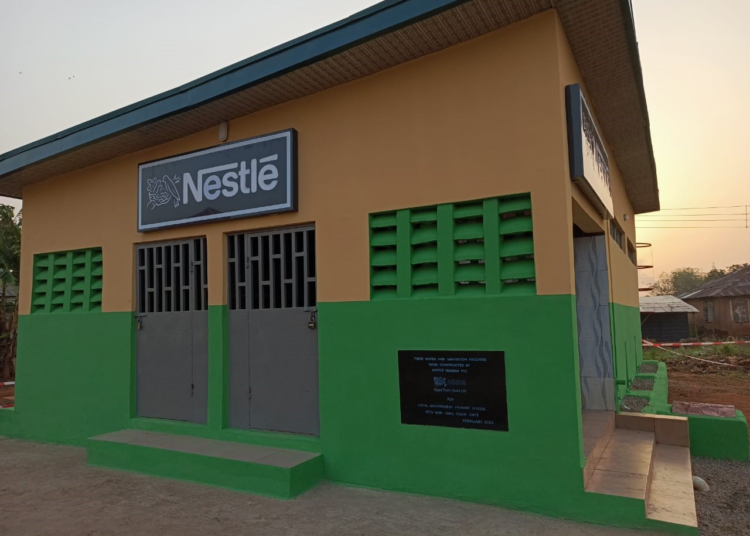Nestlé Nigeria PLC has taken a vital step to improve health and education in Ogun State by investing in water and sanitation facilities in local schools, bridging gaps in basic Water, Sanitation, and Hygiene (WASH) infrastructure.
This initiative is part of the company’s commitment to its Nestlé for Healthier Kids (N4HK) program, which promotes good health practices in young learners through four pillars: Healthy Nutrition, Healthy Hydration, Physical Activity, and Hygiene.
The absence, inadequacy, or mismanagement of water and sanitation services pose significant health risks, impeding human well-being and hindering social and economic development. Recurrent instances of WASH-related illnesses among children contribute to school absenteeism and malnutrition.
As outlined in Goal 6 of the United Nations Sustainable Development Goals (SDGs), ensuring universal access to safe and affordable drinking water, sanitation, and hygiene remains a global imperative. The World Bank estimates that 70 million Nigerians lack access to safe drinking water, and 114 million lack access to basic sanitation facilities.
The provision of WASH facilities is therefore in line with the fact that water, sanitation, and hygiene are fundamental human rights crucial for favorable outcomes in education, Nutrition, health, livelihoods and community socio-economic development.
Recognizing hygiene as a crucial component of the N4HK program and affirming the difficulty of hygiene practice and education in the absence of basic water and sanitation facilities, Nestlé’s investment in water and sanitation facilities for beneficiary schools underscores its commitment to comprehensive health education, enhancing quality of life and building thriving communities.
At LG Primary School, Adie Owe, in Ado-Odo-Ota Local Government Area, students and teachers celebrated as the newly installed water and sanitation facilities were inaugurated recently. This infrastructure will serve over 500 people, including educators, students, and surrounding community members, helping to create a healthier and more conducive learning environment.
Students shared their appreciation, noting how the improvements have reduced the need to walk long distances for water and fostered better hygiene practices. For instancd, primary five student Darasinmi Agunbiade remarked, “With separate toilets for girls and boys, it’s easier to follow what we learn in our hygiene classes.”
Acknowledging the need for comprehensive hygiene education, Nestlé’s corporate communications and public affairs manager, Victoria Uwadoka, explained the importance of these facilities for practicing proper hygiene, one of the N4HK program’s main pillars. “In Ogun State alone, we’ve completed and commissioned facilities in ten schools, benefiting over 4,000 students, educators, and local residents,” she said, highlighting the alignment of Nestlé’s efforts with the United Nations Sustainable Development Goal 6 (SDG-6), which advocates for universal access to clean water and sanitation.
The initiative drew appreciation from the Ogun state government. Prof. Abayomi Arigbabu, the Commissioner of Education, Science, and Technology, applauded the company’s collaboration with the state to improve school environments, enhancing safety and health for learners.
Dr. Femi Majekodunmi, Chairperson of Ogun State Universal Basic Education Board (SUBEB), also acknowledged Nestlé’s impact, citing its continuous efforts to support public education through its N4HK program, which has now reached 20 schools in four local government areas.
In February 2024, Nestlé also provided a Water and Sanitation Facility at Wesley School 2, Sagamu, further emphasizing the company’s commitment to fostering healthy, productive school environments across Nigeria. This recent facility brings Nestlé’s total WASH contributions nationwide to twenty, reflecting a growing impact on communities and the nation’s educational landscape.
We’ve got the edge. Get real-time reports, breaking scoops, and exclusive angles delivered straight to your phone. Don’t settle for stale news. Join LEADERSHIP NEWS on WhatsApp for 24/7 updates →
Join Our WhatsApp Channel










